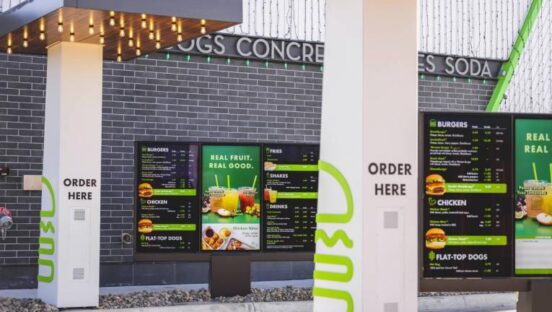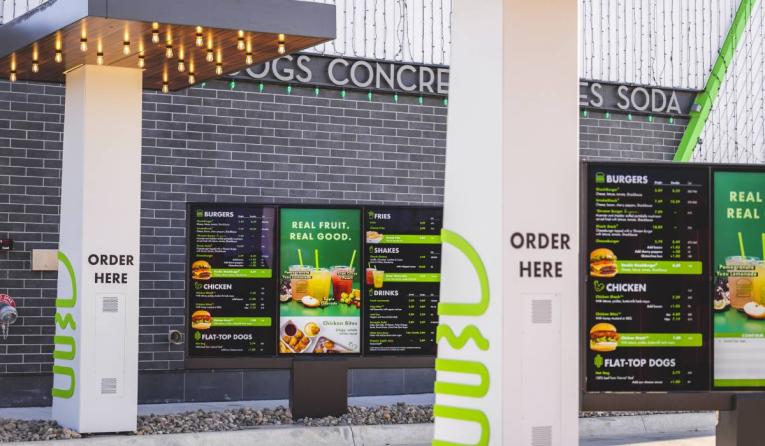Following weekend reports of activist investor Engaged Capital’s plans to wage a proxy battle at Shake Shack, the parties struck a cooperation agreement that will add former Domino’s CFO Jeffrey Lawrence to the board. In addition, Shake Shack will work with Engaged Capital, which, including swaps, owns a roughly 6.6 percent stake in the burger brand, to identify and appoint another independent director “with restaurant operations experience.”
There are other changes in store. Shake Shack agreed to retain a consulting firm to support its ongoing initiatives and improve execution, it said, alongside cost structure and profitability efforts. Founder Danny Meyer, who serves as Shake Shack’s chairman of the board as well as Union Square Hospitality Group, and “certain of his affiliates,” will step down their director designation rights over time.
Meyer introduced Shake Shack in 2004 as a hot dog cart designed to benefit New York City’s Madison Square Park.
In return for Shake Shack’s agreement, Engaged Capital said it would abide by certain customary standstill and voting commitments and will support the board’s full slate of directors at Shake Shack’s 2023 annual meeting of stockholders.
READ MORE: Inside Shake Shack’s journey back
The Wall Street Journal reported on Sunday, per people familiar with the matter, Newport Beach, California-based Engaged Capital, which manages roughly $1 billion and previously pushed Jamba’s parent company to cut costs, believed it had determined strategies to double Shake Shack’s profitability within two years and asked the chain to eliminate its staggered board. Or make it so all directors were not up for election at the same time.
The Journal said Engaged Capital was in talks with Shake Shack management for more than six months and sent a letter to the board in March detailing this proposal for new directors and other initiatives. An agreement wasn’t reached. In the letter, Engaged Capital founder and chief investment officer Glenn Welling said, according to the Journal, “In order for the company to reach its full growth potential and profitably scale this brand across the U.S. and the world, we believe significant adjustments to the company’s real estate strategy, store design, labor planning and supply chain framework will be required.”
“We appreciate our constructive dialogue with Engaged Capital and believe the appointment of Jeff and another new director will benefit our Company and stockholders,” Shake Shack CEO Randy Garutti said Tuesday in a statement. “We are executing our strategic plan and share Engaged Capital’s view that Shake Shack can drive additional profit growth. We look forward to continuing to increase stockholder value.”
Meyer called Lawrence, currently the CFO of tech company ShiftKey, a “seasoned leader.” The Journal reported Engaged’s nominees were former Noodles & Company leader Kevin Reddy, Joel Bines of AlixPartners, and Engaged Capital cofounder Christopher Hetrick.
“It became clear that Jeff is an ideal addition to our board after an extensive search that began in January 2023 led by the Nominating & Corporate Governance Committee of the board,” Meyer said in a statement. “Given his expertise in scaled operations, digital, and international expansion, as well as his strong financial leadership experience, we believe he will be able to make immediate and impactful contributions to Shake Shack. I am also pleased that we reached an agreement with Engaged Capital, one of our largest stockholders, that I believe will further our mutual goal of enhancing stockholder value.”
Shake Shack told Reuters its stock is up more than 50 percent year-to-date and the company is “well positioned to continue enhancing value for shareholders.”
“We are executing our strategic plan and making substantial operational and financial progress,” a spokesperson said.
As of Friday, Shake Shack had a market capitalization of about $2.8 billion. Its stock entered Tuesday trading at $70. It was as low as $38.07 on June 16 of last year and $41.53 this past December. Since May, Shake Shack surged up from $52.82. Even after rallying, though, shares are nearly half from an early 2021 high.
Profitability has been top of mind for Shake Shack through its pandemic recovery, namely of late. In the first three months of the year, restaurant margins were 18.3 percent, a 310-basis-point improvement year-over-year and the highest Q1 profitability since COVID cratered Shake Shack’s urban-heavy business.
The brand generated record quarterly profit dollars ($45 million) and adjusted EBITDA ($27.6 million, 164 percent increase year-over-year) during what’s typically the softest sales quarter of the year.
Going back, Shake Shack city-center drag coupled with a lack of drive-thrus plunged its U.S. sales as much as 90 percent at some U.S. venues in the opening COVID weeks. Its average weekly sales sunk to $32,000. But the chain flipped trends quickly, opening access through drive-thru locations, “Shake Track [pickup windows, etc.]” and growth across its digital footprint.
In March 2020, digital sales mixed 23 percent of the business. That climbed to 81 percent by May and settled to 59–62 percent by the final six months of 2020.
In one lead directive, Shake Shack announced last year it would implement kiosk ordering—its most profitable channel—in nearly all restaurants by the end of 2023 (ultimately all will have them). The brand has installed kiosks in 90 restaurants since the beginning of 2022. Because they visually display menu items, average check is higher, the company said, with customers more likely to include premium LTOs, burger add-ons, and cold beverages. Plus, customers tend to stay in the restaurant, meaning Shake Shack saves on packaging costs.
In 2022, Shake Shack totaled nearly $500 million in combined digital and kiosk sales, mixing 57 percent of the business. That’s growth from $442 million (62 percent mix) in 2021, $329 million in 2020 (65 percent mix), and $147 million (26 percent mix) in 2019. In stores where kiosks are present, 75 percent of sales come via kiosks or digital orders.
Labor benefits are coming from kiosks, as well, which doubled sales compared to 2022. The ordering channel helped in-store same-store sales jump more than 20 percent year-over-year (kiosks are counted as in-store transactions, not digital ones). Restaurants with kiosks run more efficiently at a time when staffing and retention are still a pain point.
On profitability, Shake Shack’s operating profit has tracked as follows:
- Q1 2022: $30 million, 15.2 percent margin
- Q2 2022: $42 million, 19 percent margin
- Q3 2022: $36 million, 16.4 percent margin
- Q4 2022: $44 million, 19 percent margin
- Q1 2023: $45 million, 18.3 percent margin
Shake Shack is guiding profit margins of 19–20 percent for fiscal 2023 and a return to plus 20 percent in the future.
The brand, like much of the sector, has gotten there partly through pricing. It implemented a mid-single-digit price increase this past quarter and continues to work to drive sales into first-party channels.
Shake Shack’s Q1 same-store sales lifted 10.3 percent year-over-year, with traffic up 4.8 percent. First-quarter average weekly sales per restaurant rose 7.4 percent to $73,000 ($3.8 million in annualized AUV). That includes $72,000 in January, $71,000 in February, and $76,000 in March. In April, average weekly sales per unit were $77,000, a 4 percent bump year-over-year.
Labor expenses were $74.3 million, or 30.4 percent of sales, down 30.7 percent year-over-year, but up 150 basis points quarter over quarter. Operating costs were $34.9 million, or 14.3 percent of sales. This decreased 100 basis points versus 2022, thanks to menu price, first-party channels, lower marketing costs, and better management of expenses, like R&M.
Shake Shack has also opened 28 stores in the past six months, with six corporate and seven licensed arriving in Q1. Twenty-five more are under construction and the full-year goal is to bring 40 company run and 35 licensed stores to market this year. Of those, 15 are projected to include a drive-thru.
Shake Shack ended Q1 with 449 units systemwide (295 in the U.S.)
“We are pleased to have aligned with the Board on a constructive path forward to helping Shake Shack achieve its potential. Due to its strong brand, elevated product and uplifting guest experience, Shake Shack has a unique opportunity for substantial profitable growth. Jeff and an additional director with expertise successfully scaling profitable restaurant concepts will be tremendous additions to the Board as the company continues to improve the guest experience, Shack and company profitability and returns on capital,” Welling added in a statement.










